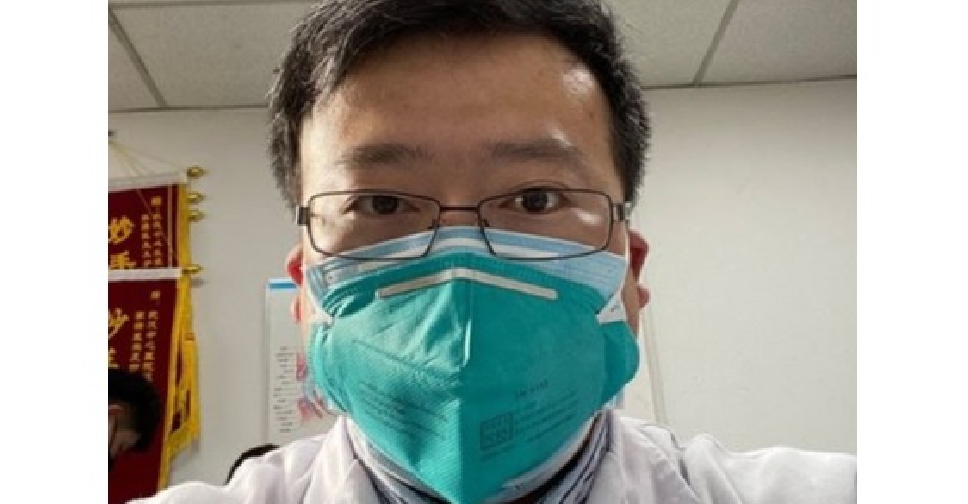By: Israel Umoh
The news hit the airwaves like a thunderstorm. The story blasted the eardrums like a tornado. The picture of the dead whistleblower doctor in the social media headlined: “Death of whistleblower doctor of Coronavirus” was heart-rending. Yet, “We can repress everything but not sorrow” struck an emotional chord.
Li Wenliang, an ophthalmologist, posted his story on Weibo from a hospital bed a month after sending out his initial warning.
The 34-year-old Chinese, while working at Wuhan Central Hospital, had noticed seven cases of a virus that he thought looked like Sars – the virus that led to a global epidemic in 2003.
On December 30, he sent a message to fellow doctors in a chat group warning them to wear protective clothing to avoid infection.
Four days later, he was summoned to the Public Security Bureau where he was told to sign a letter. In the letter, he was accused of “making false comments” that had “severely disturbed the social order.”
He was one of eight people who police said were being investigated for “spreading rumours.” Local authorities later apologised to Dr. Li.
In his Weibo post, he described how on January 10, this year, he started coughing, the next day he had a fever and two days later he was in the hospital. He was diagnosed with the coronavirus on January 30.
Unfortunately, Wenliang who contracted the virus is one of the 724 persons killed by the deadly coronavirus, a virus that causes severe acute respiratory infection and symptoms usually start with a fever, followed by a dry cough.
His death, no doubt, sparked a wave of anger and grief in the Chinese social media site on Thursday.
The top two trending hashtags on the website were “Wuhan government owes Dr. Li Wenliang and apology” and “We want the freedom of speech.” Another screamed: “I want the freedom of expression!”
“Now the spin doctors and censors will try to find a way to convince 1.4 billion people that Dr. Li’s death is not a clear example of the limits to the party’s ability to manage an emergency – when openness can save lives, and restricting it can kill,” BBC wrote.
Some newspapers and critics accuse the communist regime of lacking transparency, like what happened in 2002-2003 with the epidemic of SARS (Severe Acute Respiratory Syndrome), which had killed nearly 800 people worldwide.
Others castigated that the death lays bare the worst aspects of China’s command and control system of governance under Xi Jinping – and the Communist Party would have to be blind not to see it.
Yet, the Bible in Matthew 7:5 warns Thou hypocrite, first cast out the beam out of thine eye; and shalt thou see clearly to cast out the mote out of thy brother’s eye. It is sheer hypocrisy for them to cast away communist China as information oppressor knowing that other systems of government are equally felons. Not that the system is perfect, ditto with socialist, capitalist and authoritarian systems.
Government is a close circuited entity shrouded in secrecy. Every government in any part of the world is opaque in nature and operation but is overt to those known as cabal in Nigeria, mafia or inner kitchen in other systems.
A whistle blower is seen as a person who exposes secretive information or activity that is deemed illegal, unethical, or not correct within a private or public organization. Who in the private or public sector befriends a whistleblower seen as a spy by the corrupt?
In fact, whistle-blowing can lead to a breakdown of trust, thus exposing whistle-blowers to hostility and resentment from peers and superiors as well as physical harm. Still, a whistle-blower may get the cold shoulder or be treated like a “rat” or “snitch.” For instance, President Donald Trump on Friday fired two of his aides who were whistleblowers after his acquittal from impeachment charges by the US Senate. He fired Lt Col Alexander Vindman, a top Ukraine expert, and US envoy Gordon Sondland, who testified against him at the trial.
Metaphorically, however, the death of the medical practitioner exemplifies suppression and annihilation of truth and transparency on issues deemed detrimental to the overriding interest of the government. The communist, socialist, capitalist, feudal and authoritarian systems are culprits. His death demonstrates, in clear terms, how the helpless and the less privileged are mere tools of persecution and subjugation in the hands of the power-that-be or its agents. The doctor had died, but his patriotic zeal and altruistic efforts of others to make the society a better place for all are not accorded importance by the ruling class whose interest is not protected. What a tragedy!
While alive, Wenliang was bashed not because of his medical profession but because of his emergency role- whistleblowing. He was queried for disdain to the rule of engagement by not reporting officially to the appropriate authority. His decision to publicly expose the virus showed that the doctor infringed Oath of Official Secrecy. But then, two wrongs do not make a right. The Chinese government was obligated to have timely treated the information with alacrity rather than footdragging on the virus, which is now pandemic.
In Nigeria, the Federal government threw its door open for whistleblowers of looted funds but may not welcome any whistleblowing on matters affecting it. Akwa Ibom government cannot be happy with any whistleblower who discloses how the various sums expended on the funding of its industries, the total number of public servants in its employ and some shady deals of public office holders, among other issues.
Let governments in Nigeria and in the world crave for constructive criticisms, truth and transparency to allow for the inclusiveness of the citizenry. By this, governments can utilise abundant human and other resources in their enclave for meaningful development and growth.

